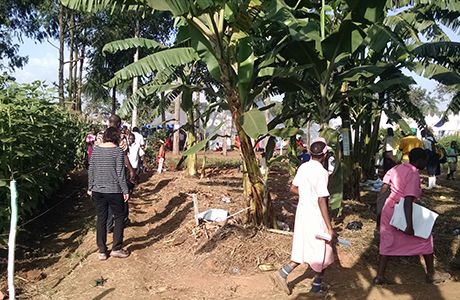Main Content

When graduate students enter our class on International Agricultural Development in the fall, they have no idea of the enormous role that their two instructors play in U.S. policy making around this subject. Rutgers Distinguished Professor Carl Pray and Associate Research Professor Anwar Naseem, both of DAFRE, are responsible for evaluating the global food security strategy of the U.S. Agency for International Development under its 2010 Feed the Future Initiative.
This task is even bigger than it sounds. Under a million-dollar-a-year grant from USAID and USDA, Drs. Pray and Naseem manage an international group of scholars who have been charged with conceptualizing, operationalizing, measuring, and evaluating a completely new vision of international development. The essence of this vision is captured in the title of a 2019 Policy Brief issued as part of the project: From Green Revolution to Contemporary Agricultural Transformation.
Launched under U.S. leadership in the 1960s, the Green Revolution model of development had a simple formula: (1) Increase agricultural yields as fast as possible to reduce hunger; (2) Encourage farmers freed up by increased rural productivity to migrate to the city, where industrialization will take place; (3) Rinse, repeat.
Many 21st-century policy priorities are missing from this development formula. They include equity and inclusivity, environmental protection, resilience in the face of climate change, and nutrition goals that go beyond just solving the urgent problem of food insecurity. A word frequently used by the Rutgers-led research team to describe USAID’s new vision is “holistic.”
“If you aren’t measuring it, you probably aren’t achieving it,” says Professor Naseem. That explains why he has led project efforts to create a “multidimensional index of agricultural transformation.” The Rutgers-led Policy Research Consortium has also created cutting-edge measures of nutritional outcomes, water availability, and private-sector agricultural R&D in developing countries. The last of these development factors has grown in importance since the Green Revolution—but it would be nearly invisible to global policy makers were it not for the research of DAFRE’s Professor Pray over many years.
We have said that Feed the Future describes a new vision for international development, one that was created by the Obama administration with significant bipartisan support in the U.S. Congress. Is there an alternative vision?
The director of the Rutgers-led project, Carl Pray, says yes. In September of 2021, the United Nations held a Food Systems Summit that, like Feed the Future, was also focused on global agricultural transformation. But according to Pray, the UN summit was “dominated by European ideas related to agro-ecology.” Genetically modified organisms, for example, were “off the table.” In contrast, GMOs and other controversial technologies remain on the menu of tools approved by the U.S. international development establishment.
Why this policy choice? “Just because we want to be holistic doesn’t mean we should forget about the need for productivity growth,” says Naseem. Pray adds that although the productivity effects of agro-ecological approaches are not well studied, growing crops organically has been shown to reduce yields by about 20%. This represents, he says, “a penalty in food output that the world’s poorest countries may not be willing to accept.”
With these competing visions, it is clear that donor countries and developing countries will have many important decisions to make as the 21st century matures. Drawing on the expertise of other land grant scholars, and with funding from the largest donor country in the world, DAFRE professors have led some of the most important research informing those decisions.
NOTE: The project led by Pray and Naseem is formally titled Feed the Future Policy Research Consortium. The project held its closing conference on November 2nd and 3rd of 2021.